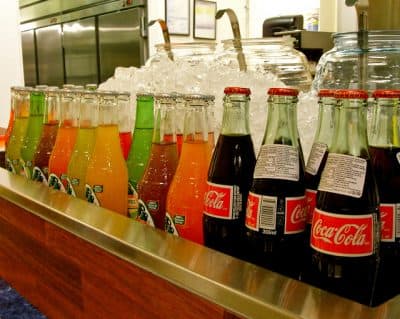Advertisement
Tax Soda? How About Making Fruits And Veggies Cheaper, Too?

[Readers, please weigh in: Even putting the soda tax issue aside, should government intervene to make fresh fruits and vegetables cheaper?]
Last July 31, a proposal to tax soda in Massachusetts officially died.
Temporarily, that is. Now, it lives again. Last week, Gov. Deval Patrick revived it in his state budget, calling to lift the sales tax exemptions on candy and soft drinks.
Just to recap: Since candy and soda are considered food (though we could certainly debate whether they should be), they carry no sales tax when you buy them. Anti-obesity advocates have been pushing to change that. A couple of states — Washington and Colorado — have restored the sales tax to sugary stuff, but the political battles are hard.
Here, though Massachusetts tends to be a highly progressive state on issues of health, the soda tax proposal just couldn't gather the political momentum it needed in the last legislative session.
Now that the idea appears headed back onto the political front-burner, I spoke with Sean Cash, an associate professor at Tufts and an economist who has worked on food taxes and how they influence consumer choices. Our conversation, lightly edited:
So what do you think of soda taxes?
It is a little perverse right now that we're favoring the soda and not favoring something healthier just because it was steamed and spiced a little.
It depends on the motivation. In general, from the health point of view, the discussion has been, "Let's tax soda: It's not good for you, and if we raise the prices, people will drink less of it." That's all true — when prices go up you buy less, but with soda, and food and beverages in general, we don't buy a lot less. It's what an economist calls inelastic. We do pay attention to price, but not a huge amount. It's hard to get people to stop drinking what they like by using price. I can get people to switch brands pretty easily, at least for today, but to get people to stop drinking soda, a tax is a blunt instrument.
The flip side is, if I raise the price and you don’t drink less, it’s a great way of raising revenue. Though the evidence shows that it is regressive: Lower-income people will pay more, not just relative to their income but in absolute terms as well, because lower-income people tend to spend more on soft drinks.
The way Patrick is doing it is less concerning, because he's wrapping it up in a whole reform of sales tax, to lower the sales tax by about a percentage point but extend it to cover sodas and candy. So the increased taxation on soda would be somewhat regressive, but sales taxes in general are regressive, because lower-income people save less money and spend a higher percent.
So to lower the sales tax across everything is progressive, and he makes part of that money back by taxing soda and candy, and part from income taxes. So the whole suite of changes would probably be on balance slightly progressive, even though the soda tax is regressive.
Another approach would be to put an excise tax on soda — a separate tax the way we have separate taxes on cigarettes and alcohol. There's not a lot of that in this country, though France put one in last year. It's a good way to raise revenue. It's not going to help health much but people would reduce their consumption a little bit.
Right now, we have a sales tax where we don’t tax soda, and we don't tax fresh fruit and vegetables, but we do tax prepared vegetables. So if you go to the supermarket and go to the take-away food section and get a container of hot food — if you buy the steamed sesame green beans — that is subject to a sales tax for prepared food items. But the soda you grab out of the cooler next to it isn't taxed. So even though I'm not a big proponent of soda taxes to improve health, it is a little perverse right now that we're favoring the soda and not favoring something healthier just because it was steamed and spiced a little. So if you're going to tax things, you might as well tax stuff you want to discourage, because a higher price will put a little behavioral damper on people's consumption.
So what's this idea of a 'thin subsidy'?

In our research, we've modeled what happens if you lower fresh fruit and vegetable prices in terms of disease outcomes. It's similar to soda in that if I make it just a little bit cheaper, I'm not going to change what people eat a huge amount. But I will get people to eat more fresh food and across the population that can help health, particularly because the people with the lowest income tend to eat the fewest fresh fruits and vegetables. if you add one serving of fresh fruit and vegetables a week to someone's diet, it makes a lot more difference if you’re not eating a lot to begin with than someone already eating ten portions. So the extra benefit of increasing that consumption is higher for folks currently eating little. So it's progressive from an income point of view, and it would make a difference for health.
There has been talk about using taxes and subsidies together to really change prices of food. As in: Let’s tax the heck out of soda, double the price, and make all the fruits and vegetables a lot cheaper. The problem is that it's very hard to implement. You're putting a lot of pressure on the retailer, and the bottom line is that small price differences only make very small differences in consumption. If you really want to change prices a lot — double the price of soda, the way we did with cigarettes — then you can change behavior in a bigger way, but then you are also really micro-engineering people's food choices, and people will object because they'll see it as paternalistic, and very heavy-handed.
I don't think there's the political will for that. It's complicated, and if you're going to get that dictatorial about what people should be eating, is the price system the best way to do that? We've not shown the will to be that aggressive.
A lot of people blame agricultural policies for obesity, but that's way overblown. There are price differences, but they're minor, and they're all to protect producers, it's never done with health in mind. So you could put a health filter on production policies, as we've done with environmental considerations. But the truth is, we also mess with prices in the way we subsidize transportation infrastructure, water conveyance in western states, and all of our agricultural policies. We mess with prices in all sorts of ways that are bad for health but also in some that are good for health — usually without thinking about health at all.
So how could we engineer the state's coming tax plan so that it's optimal for health but within the realm of the politically possible?
I think small changes in the sales tax are minor but useful. Giving tax breaks for physical activity is something you can do, though it’s an expensive way to go. Public information and public messaging is useful up to a point. Obesity has increased, but it's been gradual, and so small changes can reverse that trend. So on the one hand, you may not change the world by taxing soda three cents. On the other hand, small changes got us into trouble, so small changes can help get us out. But you're not going to have overnight success.
Better food labeling will help, too. All these things together, to can change people's overall perceptions about what's appropriate and healthy.
Taxes won’t make a big difference on their own, but if you tax something, and scream up and down that you're taxing it because it's bad, and do fifty other things — then maybe...Even tobacco took decades, and foods are always going to be messier because we don't have that clear dose response, you can't demonize even the least nutritious foods as being as bad as tobacco. Soda is as useless a food item as you can find and even that's not straightforward.
The way Patrick has designed his tax proposals, I personally am in favor. If he starts billing this as a huge health-promoting activity, well, no. It's removing a tension that doesn't need to be there, and sending a small signal.
Further reading: How one man tried to slim down big soda from the inside.
This program aired on January 28, 2013. The audio for this program is not available.
